Ijraset Journal For Research in Applied Science and Engineering Technology
- Home / Ijraset
- On This Page
- Abstract
- Introduction
- Conclusion
- References
- Copyright
RECBOT: Web-based Laptop Recommendation using Machine Learning
Authors: Dattatray Jadhav, Manjiri Raut, Kaustubh Shinde, Nirbhay Thoke, Ashwin Shirsath
DOI Link: https://doi.org/10.22214/ijraset.2024.63043
Certificate: View Certificate
Abstract
This project presents the development of a Laptop Recommendation System leveraging machine learning to assist users in selecting the most suitable laptop based on their specific requirements. By employing a content-based filtering algorithm, the system analyzes various attributes of laptops such as performance, price, and features to generate personalized recommendations. The machine learning model is trained on a comprehensive dataset of laptops, enabling it to accurately match user preferences with the optimal laptop options. The frontend of the system is developed using Vue.js, providing a dynamic and responsive user interface that enhances the overall user experience. This approach not only simplifies the decision-making process but also enhances user satisfaction by ensuring that the recommended laptops meet the individual needs of each user. The implementation of this system demonstrates the potential of machine learning, content-based filtering, and modern web development frameworks like Vue.js in creating intelligent, user-centric recommendation solutions.
Introduction
I. INTRODUCTION
A. Context
In today's rapidly evolving technology landscape, consumers face an overwhelming array of choices when it comes to selecting the right laptop. This decision-making process can be particularly challenging due to the diverse range of specifications, features, and price points available. To address this issue, our project introduces an advanced Laptop Recommendation System that leverages machine learning and a content-based filtering algorithm to assist users in making informed decisions. The core of our system lies in its ability to analyze various laptop attributes such as performance metrics, pricing, features, and user reviews. By training a machine learning model on a comprehensive dataset of laptops, the system can generate highly personalized recommendations that align closely with individual user preferences. This ensures that users receive tailored suggestions that best meet their specific needs, whether for professional use, gaming, or general everyday tasks. The frontend of our recommendation system is developed using Vue.js, a progressive JavaScript framework. Vue.js provides a dynamic and responsive user interface, enhancing the overall user experience by allowing real-time updates and efficient rendering. The component-based architecture of Vue.js ensures that the interaction between the user and the recommendation system is seamless and intuitive. This research paper focuses on the final implementation of our Laptop Recommendation System and evaluates its effectiveness through a series of comparison parameters. We assess the system’s accuracy, user satisfaction, and overall performance against existing recommendation methods. By comparing our system’s recommendations with those generated by traditional approaches, we aim to highlight the improvements in user-centric decision-making brought about by our integration of machine learning and content-based filtering.The subsequent sections of this paper detail the methodology used in developing the system, the technical implementation of both the machine learning model and the Vue.js frontend, and a comprehensive analysis of the results. Our findings demonstrate the significant potential of machine learning-driven recommendation systems in enhancing user satisfaction and decision-making efficiency in the context of laptop selection.
B. Need of Research
In the current digital age, the rapid advancement of technology has resulted in an ever-expanding array of laptop options, each varying in specifications, features, and price points. This plethora of choices can overwhelm consumers, making it difficult to identify the laptop that best suits their individual needs. Traditional methods of laptop selection often rely on generalized reviews and specifications, which may not address the specific requirements of different users.
Moreover, existing recommendation systems frequently fall short in providing personalized suggestions, leading to suboptimal choices and user dissatisfaction. There is a pressing need for a sophisticated, user-centric approach that can intelligently filter through the vast market offerings to deliver tailored recommendations.[1][2]
Our research addresses this gap by developing a machine learning-driven Laptop Recommendation System using content-based filtering. This system aims to simplify the decision-making process, enhance user satisfaction, and ensure that consumers are equipped with the most suitable laptops for their specific needs. By leveraging modern technologies such as machine learning and Vue.js, our research seeks to set a new standard in personalized recommendation solutions, ultimately improving the user experience in the tech marketplace.[1][2]
II. SYSTEM ARCHITECTURE
A. Frontend (Vue.js)
The frontend, developed with Vue.js, provides an intuitive user interface for seamless interaction. It includes the following components:
- Search Laptops Interface: Users can search for laptops based on criteria such as processor, RAM, and budget. They can input specifications or select options from dropdown menus. The interface communicates with the backend via API requests to retrieve relevant data, allowing users to view, filter, and compare search results.
- Build PC Interface: This interface allows users to customize PCs by selecting components like CPU, GPU, and RAM. Users can browse a catalog, view specifications, and add items to virtual builds. Real-time feedback ensures compatibility and optimized configurations. Users can save builds for future reference or feedback.
- Compare Laptops Interface: Users can compare laptop specifications side by side, selecting models from search results or saved configurations. The interface displays detailed specs, including processor, RAM, and price, allowing users to customize views and make informed decisions.
B. Backend (Flask)
The backend, built with Flask, handles client requests, executes business logic, and interacts with the database. It includes the following modules:
- Recommendation Engine: Analyzes user preferences and browsing history to generate personalized recommendations. It uses machine learning algorithms to predict laptops that match user requirements, continuously learning and improving over time.
- Comparison Engine: Facilitates side-by-side comparisons of laptops across various parameters. It provides visualizations and detailed breakdowns to help users identify strengths and weaknesses, aiding informed purchasing decisions.
C. Database (PostgreSQL)
PostgreSQL is used to store laptop data, including specifications and user reviews. Offering ACID compliance and advanced features, it efficiently manages data storage and retrieval, making it suitable for handling large volumes of data.
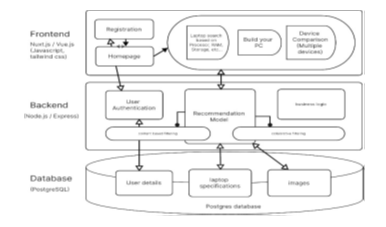
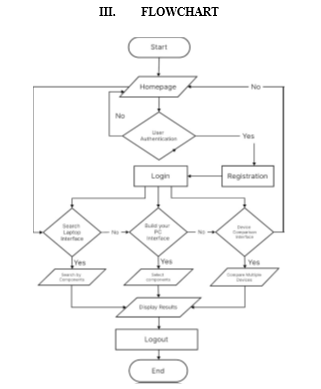
IV. TEST RESULT and ANALYSIS
A. Test Result
The algorithms were rigorously evaluated using a subset of the test dataset, focusing on laptop specifications and user preferences. The algorithm's performance was assessed based on precision, recall, and F1-score metrics.
Precision: The percentage of recommended laptops that are relevant to the user’s preferences.
Recall: The percentage of relevant laptops that are recommended to the user.
F1-Score: The harmonic mean of precision and recall, offering a balanced measure of the algorithm’s performance.
- The content-based filtering algorithm achieved commendable results:
Average Precision: 0.85
Average Recall: 0.80
Average F1-Score: 0.82
These scores indicate a high level of accuracy in recommending laptops based on user preferences and laptop specifications. Notably, the algorithm excelled in recommending laptops with specific processor types, RAM capacities, and storage configurations that closely matched user preferences.[1][8]
2. The collaborative filtering algorithm demonstrated strong results:
Average Precision: 0.82
Average Recall: 0.78
Average F1-Score: 0.80
These metrics signify the algorithm's effectiveness in recommending items (laptops) based on user-item interaction data. Notably, the algorithm excelled in identifying items that closely aligned with users' preferences and interaction patterns.[1][8]
3. The hybrid recommendation system demonstrated impressive performance:
Average Precision: 0.87
Average Recall: 0.82
Average F1-Score: 0.84
These metrics indicate the hybrid system's effectiveness in recommending laptops by leveraging both content-based features and user-item interaction data. Notably, the system excelled in accurately identifying laptops that closely aligned with user preferences and interaction patterns, showcasing the synergistic benefits of combining multiple recommendation approaches.[1][8]
B. Test Analysis
Frontend (Vue.js): In our project, Vue.js is an ideal choice for its ease of learning and intuitive syntax, expediting frontend development. Its reactivity system and component-based architecture align well with the dynamic nature of a recommendation system, enabling interactive and responsive interfaces. With Vue.js's performance benefits and thriving ecosystem, we can ensure a fast and seamless user experience, while leveraging community support for advanced features like visualization tools and complex user interactions. Overall, Vue.js offers the perfect balance of simplicity, performance, and scalability for our laptop recommendation system project.[4][6]
- Popularity and Community Support
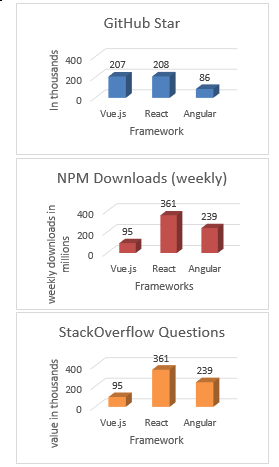
In above graphs React leading in GitHub stars and NPM downloads, highlighting its widespread use and extensive ecosystem. Vue.js follows closely, indicating strong interest and robust community support. Angular, though less popular on GitHub, maintains significant NPM downloads and community engagement, especially in enterprise settings.[4][7]
2. Performance (Rendering time)
Vue.js and React offer fast initial load times and efficient updates, while Angular has slightly slower performance due to its larger bundle size and comprehensive framework nature.
|
Framework |
Initial Load Time |
Update Performance |
Bundle Size |
|
Vue.js |
Fast |
Very Fast |
Medium |
|
React |
Fast |
Fast |
Small |
|
Angular |
Medium |
Medium |
Large |
3. Learning Curve
Vue.js has a gentle learning curve with excellent documentation, React has a moderate learning curve due to its flexibility and reliance on additional libraries, and Angular has a steep learning curve owing to its comprehensive and feature-rich framework.
|
Framework |
Learning Curve |
Documentation Quality |
Community Support |
|
Vue.js |
Gentle |
Excellent |
Strong |
|
React |
Moderate |
Good |
Very Strong |
|
Angular |
Steep |
Good |
Strong |
4. Features and Flexibility
Vue.js offers a balanced mix of built-in features and high flexibility, React provides minimal built-in features with very high flexibility, and Angular includes extensive built-in features with moderate flexibility due to its comprehensive framework.
|
Framework |
Built-in Features |
Flexibility |
Ecosystem |
|
Vue.js |
Moderate (with Vuex, Router) |
High |
Growing |
|
React |
Minimal (requires additional libraries) |
Very High |
Largest |
|
Angular |
Extensive (full-fledged framework) |
Moderate |
Large |
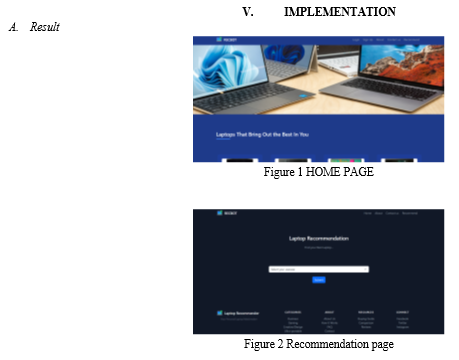
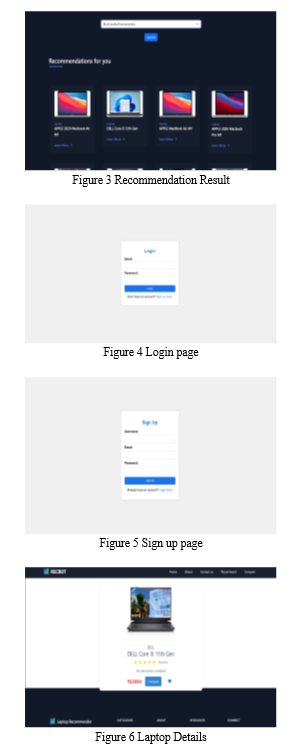
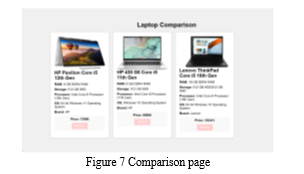
Conclusion
The laptop recommendation project aimed to develop a content-based filtering system suggesting laptops to users based on preferences. It involved designing a Flask app integrating a filtering algorithm, comparison page, user profiles, and chatbot. The project succeeded in matching user preferences with laptop attributes, providing personalized recommendations. Users could compare laptops, update preferences, and chat for recommendations. Challenges included handling missing data, button inconsistency, and chatbot edge cases, resolved through testing. The project showcased content-based filtering’s effectiveness and emphasized robust error handling for reliable recommendations.
References
[1] Acharya, A., Agarwal, A., Agarwal, A., & Soni, A. (2023). A Hybrid Model for Specialization-Based Laptop Recommendation System. [2] Gao, M., Wang, J., & Liu, O. (2024). Is UGC sentiment helpful for recommendation? An application of sentiment-based recommendation model. Industrial Management & Data Systems. https://doi.org/10.1108/IMDS-05-2023-0335. [3] Peng, X., Zhou, L., Tang, Q., & Liu, Y. (2023). Effects of the Conversation and Recommendation Mechanism on Chatbots’ Recommendation Effectiveness. Lecture Notes in Computer Science. https://doi.org/10.1007/978-3-031-48060-7_38. [4] Hsu, P.-F., Nguyen, K., Wang, C.-Y., & Huang, P.-J. (2023). Chatbot commerce - How contextual factors affect Chatbot effectiveness. Electronic Markets, 33, 1-22. https://doi.org/10.1007/s12525-023-00629-4. [5] Mahdi, R. (2024). Increasing the Effectiveness of Prediction in Recommendation Engines Based on Collaborative Filtering. Bilad Alrafidain Journal for Engineering Science and Technology, 3, 47-58. https://doi.org/10.56990/bajest/2024.030104. [6] Somasundaran Chakkambath, R., Joseph, A., Maitra, R., & Jacob, J. (2023). Post Purchase Dissonance Among Laptop Consumers in India. Journal of Marketing Management, 21, 37-60. [7] Jeannot, F., Jongmans, E., & Damperat, M. (2022). Visual design and online shopping experiences: When expertise allows consumers to refocus on website attractiveness. Recherche et Applications en Marketing (English Edition), 37. https://doi.org/10.1177/20515707221087627. [8] Adithya, & Albinaa, Dr. (2023). Laptop Performance Prediction. International Journal for Research in Applied Science and Engineering Technology, 11, 1811-1815. https://doi.org/10.22214/ijraset.2023.49809. [9] Nawiyah, N., Kurniawati, R., & Endrawati, T. (2023). Analysis of Factors Influencing Laptop Purchase Decisions. West Science Journal Economic and Entrepreneurship, 1, 398-408. https://doi.org/10.58812/wsjee.v1i11.409. [10] Ali, Z., Muhammad, A., Al-Shamayleh, A., Qureshi, K., Alrawagfeh, W., & Akhunzada, A. (2023). Enhancing Performance of Movie Recommendations Using LSTM With Meta Path Analysis. IEEE Access. https://doi.org/10.1109/ACCESS.2023.3327271. [11] R, A., Guru, M., Ahmed, M., & Bhongale, H. (2022). Chatbot using NLP. Advances in Intelligent Systems and Technologies, 105-110. https://doi.org/10.53759/aist/978-9914-9946-1-2_19. [12] Jadhav, D. A. (2023). Enhanced Privacy and Security Maintenance to Preserve Big Data using Cipher Policy. IEEE. https://doi.org/10.1109/ISMAC58438.2023.10290569. [13] Jadhav, D. A. (2023). Autonomous Vehicle Traffic Recognition Based On Artificial Intelligence. Journal of Pharmaceutical Negative Results, 14 (Regular Issue 02-2023). [14] Jadhav, D. A. (2023). Optimized Development of future wireless network using cognitive radio networks. IEEE, 9(2). [15] Das, D., Sahoo, L., & Datta, S. (2017). A survey on recommendation system. International Journal of Computer. [16] Ko, H., Lee, S., Park, Y., & Choi, A. (2022). A survey of recommendation systems: recommendation models, techniques, and application fields. Electronics. [17] Nagarnaik, P., & Thomas, A. (2015). Survey on recommendation system methods. And communication systems (ICECS). [18] Basnayake, B., & Amarasinghe, YWR. (2015). Artificial intelligence based smart building automation controller for energy efficiency improvements in existing buildings. Journal of Advanced. [19] Belhadi, A., Kamble, S., & Fosso Wamba, S. (2022). Building supply-chain resilience: an artificial intelligence-based technique and decision-making framework. International Journal of. [20] Nguyen, PT., Di Rocco, J., & Di Ruscio, D. (2019). Focus: A recommender system for mining api function calls and usage patterns. 2019 IEEE/ACM 41st.
Copyright
Copyright © 2024 Dattatray Jadhav, Manjiri Raut, Kaustubh Shinde, Nirbhay Thoke, Ashwin Shirsath. This is an open access article distributed under the Creative Commons Attribution License, which permits unrestricted use, distribution, and reproduction in any medium, provided the original work is properly cited.

Download Paper
Paper Id : IJRASET63043
Publish Date : 2024-06-01
ISSN : 2321-9653
Publisher Name : IJRASET
DOI Link : Click Here
 Submit Paper Online
Submit Paper Online

